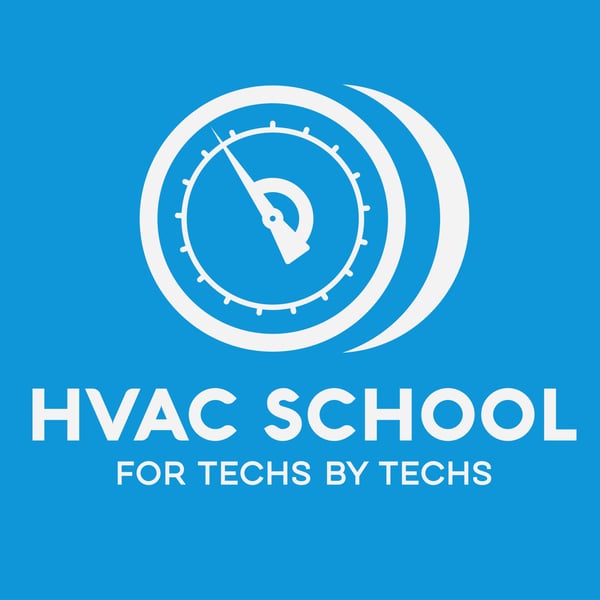Cold Coil vs. Desiccant Dehumidification
HVAC School - For Techs, By Techs
Bryan Orr
4.8 • 985 Ratings
🗓️ 26 June 2025
⏱️ 60 minutes
🧾️ Download transcript
Summary
In this comprehensive episode of the HVAC podcast, Bryan hosts an in-depth discussion about dehumidification technologies with two industry experts: David Schurk, National Sales Manager for Innovative Air Technologies, and Nikki Krueger from Santa Fe Products. The conversation explores the fundamental differences between compression refrigeration dehumidification and solid desiccant systems, providing valuable insights for HVAC professionals dealing with moisture control challenges.
David Schurk brings 44 years of industry experience and serves as an ASHRAE Life Member and Distinguished Lecturer, teaching humidity control professional development courses. His expertise focuses on solid desiccant dehumidification systems for industrial and heavy commercial applications. Nikki represents Santa Fe Products, pioneers of whole-house ventilating dehumidification technology since the mid-1990s, and discusses the growing residential and light commercial market demands driven by tighter building construction and stricter energy efficiency requirements.
The discussion delves into the critical importance of understanding dewpoint versus relative humidity measurements, a fundamental concept that often confuses technicians in the field. The experts explain how the dew point remains consistent throughout a space while relative humidity can vary dramatically based on temperature differences between rooms, floors, and ceilings. This understanding is crucial for proper system design, troubleshooting, and customer education, especially as homeowners become increasingly aware of indoor air quality concerns.
The conversation also addresses the intersection of building science and dehumidification technology, emphasizing that proper moisture control requires both well-designed building envelopes and appropriate mechanical systems. From residential applications dealing with tighter construction and mechanical ventilation requirements to industrial processes like lithium battery manufacturing requiring extremely low humidity levels, the experts highlight how different technologies serve specific market segments while sometimes overlapping in commercial applications.
Key Topics Covered
- Fundamentals of moisture control
- Compression refrigeration dehumidification
- Solid desiccant technology
- Market applications and demand drivers
- Building envelope importance
- Measurement and troubleshooting
- Water activity levels and mold prevention
- Technology boundaries
- Energy considerations
- Installation challenges
Learn more about Santa Fe's products at https://www.santa-fe-products.com/, and learn more about David's work at https://www.dehumidifiers.com/. Both David Schurk and Nikki Krueger are active on LinkedIn, too.
Have a question that you want us to answer on the podcast? Submit your questions at https://www.speakpipe.com/hvacschool.
Purchase your tickets or learn more about the 6th Annual HVACR Training Symposium at https://hvacrschool.com/symposium.
Subscribe to our podcast on your iPhone or Android.
Subscribe to our YouTube channel.
Check out our handy calculators here or on the HVAC School Mobile App for Apple and Android
Transcript
Click on a timestamp to play from that location
| 0:00.0 | This episode of the HVAC school podcast is brought to you by our trusted sponsors. |
| 0:11.0 | Carrier and Carrier.com. Carrier has been a long-term sponsor of the podcast. They've made it possible very early on for us to do what we do, and they are the products that we sell day in |
| 0:21.4 | and day out everything from single stage equipment all the way up to the green speed |
| 0:25.8 | extreme one of the most efficient products on the market today find out more |
| 0:31.0 | about what carrier has to offer and about becoming a carrier dealer by going to |
| 0:35.4 | carrier dot com field peace and Field Piece University. |
| 0:40.7 | Field Piece offers high quality product training for HVAC techs and distributors. |
| 0:45.8 | Whether you're using the tools or selling them, Field Piece has training options for you. |
| 0:51.0 | There are categories for evacuation, recovery, leak detection, and heating. Within the course |
| 0:56.8 | for heating appliances, you get to learn how to do combustion analysis and measure static |
| 1:01.6 | and gas pressure. All very important things to know. If you're a technician who's working on |
| 1:04.9 | gas, let me tell you. It's all interactive. Learn how to use the tools like job link probes |
| 1:09.8 | and how they pair with apps to help you analyze the system, create invoices, and so, so, so much more. |
| 1:17.6 | That's three sows. That's a lot of soes. Some courses even have Nate credits like the recovery best practices and VFD troubleshooting courses. |
| 1:24.8 | Find out more. Go to fieldpiece.com slash fieldpiece-dash-university. That's |
| 1:28.5 | fieldpiece.com slash field piece dash university. Refraguration technologies and their |
| 1:35.1 | viper aerosol coil cleaner for cadencers and evaporators. If you don't know, the viper |
| 1:41.5 | aerosol cleaner is a foaming cleaner that you can spray into a coil |
| 1:45.3 | with its really powerful pin spray. It has a strong degreasing capability in a convenient package. |
| 1:52.8 | It's safe to use with rinsing or no rinse, so there's zero need to bring a bulky pump |
| 1:58.0 | sprayer into the house for an evaporator coil cleaning or in many |
| 2:01.3 | refrigeration applications. And like we mentioned, it works on our evaporators and condensers. |
... |
Please login to see the full transcript.
Disclaimer: The podcast and artwork embedded on this page are from Bryan Orr, and are the property of its owner and not affiliated with or endorsed by Tapesearch.
Generated transcripts are the property of Bryan Orr and are distributed freely under the Fair Use doctrine. Transcripts generated by Tapesearch are not guaranteed to be accurate.
Copyright © Tapesearch 2025.

